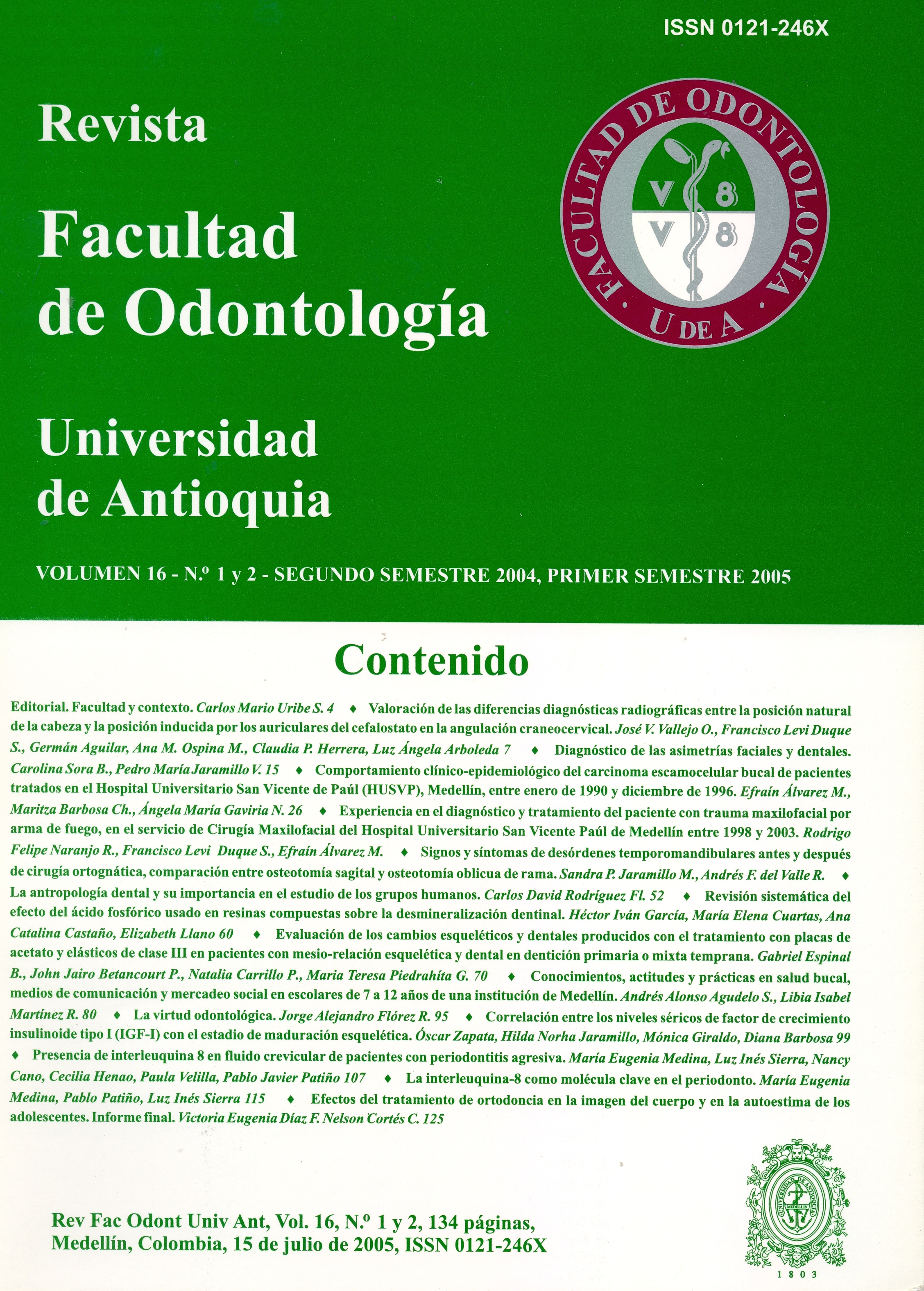Conocimientos, actitudes y prácticas en salud bucal, medios de comunicación y mercadeo social en escolares de 7 a 12 años de una institución de Medellín
DOI:
https://doi.org/10.17533/udea.rfo.3230Palabras clave:
conocimientos, actitudes, prácticas, expectativas, medios de comunicación, mercadeo social, salud bucalResumen
Una de las poblaciones más afectadas por los problemas de salud bucal es la infantil, por lo tanto se realizó la presente investigación, enfocada en los conocimientos, actitudes, prácticas y algunas expectativas frente a la salud bucal, medios de comunicación, y mercadeo social en los niños de 7 a 12 años de la escuela Rafael Uribe Uribe de la ciudad de Medellín. Para ello se diseñó un formato de entrevista estructurada con 31 preguntas que indagaron acerca del tema, y luego se hizo un análisis por categorías establecidas entre los objetivos de la investigación. Los resultados muestran como los escolares tienen algunos conocimientos con relación al papel del odontólogo cómo un ser integral en la promoción de la salud bucal, la prevención y la rehabilitación; algunos saberes previos y asociaciones con la caries dental, una percepción muy positiva ante la consulta odontológica y buena autoestima ante sus dientes. En cuanto a sus prácticas; los escolares han recibido instrucción en salud bucal tanto por el personal odontológico como de su familia y utilizan los elementos básicos para su higiene. También reconocen elementos informativos y comunicativos en el consultorio odontológico y en menor medida en la institución educativa; resaltan como importante para impartir mensajes en salud bucal a través de la charla con el odontólogo y manifiestan ciertos gustos y preferencias con medios de comunicación y publicidad en la radio, la televisión y otros. Esta información permitió el diseño de estrategias para campañas de promoción de la salud bucal, donde se tuvieron en cuenta otras disciplinas como la comunicación, la psicología y el mercadeo social como alternativas para contribuir al posicionamiento de la salud bucal en la población estudiada. Así, se constituye un marco de referencia para futuros proyectos de intervención en poblaciones específicas que involucren alto componente educativo y comunicativo.
Descargas
Descargas
Publicado
Cómo citar
Número
Sección
Licencia
El Derecho de autor comprende los derechos morales y los derechos patrimoniales.
1. Los derechos morales: nacen en el momento de la creación de la obra, sin necesidad de registro. Corresponden al autor de manera personal e irrenunciable; además, son imprescriptibles, inembargables y no negociables. Son derechos morales el derecho a la paternidad de la obra, el derecho a la integridad de la obra, el derecho a conservar la obra inédita o publicarla bajo seudónimo o anónimamente, el derecho a modificar la obra, el derecho al arrepentimiento, y el derecho a la mención, según definiciones consignadas en el artículo 40 del Estatuto de propiedad intelectual de la Universidad de Antioquia (RESOLUCIÓN RECTORAL 21231 de 2005).
2. Los derechos patrimoniales: consisten en la facultad de disponer y aprovecharse económicamente de la obra por cualquier medio. Además, las facultades patrimoniales son renunciables, embargables, prescriptibles, temporales y transmisibles, y se causan con la publicación, o con la divulgación de la obra. Para el efecto de la publicación de artículos de la Revista de la Facultad de Odontología se entiende que la Universidad de Antioquia es portadora de los derechos patrimoniales del contenido de la publicación.
Yo, el(los) autor(es), y por mi(nuestro) intermedio, la Entidad para la que estoy(estamos) trabajando, transfiero(imos) de manera definitiva, total y sin limitación alguna a la Revista Facultad de Odontología Universidad de Antioquia, los derechos patrimoniales que le corresponden sobre el artículo presentado para ser publicado tanto física como digitalmente. Declaro(amos) además que este artículo ni parte de él ha sido publicado en otra revista.
Política de Acceso Abierto
Esta revista provee acceso libre inmediato a su contenido, bajo el principio de que poner la investigación a disposición del público de manera gratuita contribuye a un mayor intercambio de conocimiento global.
Licencia Creative Commons
La Revista facilita sus contenidos a terceros sin mediar para ello ningún tipo de contraprestación económica o embargo sobre los artículos. Para ello adopta el modelo de contrato de licenciamiento de la organización Creative Commons denominada Atribución – No comercial – Compartir igual (BY-NC-SA). Esta licencia les permite a otras partes distribuir, remezclar, retocar y crear a partir de la obra de modo no comercial, siempre y cuando nos den crédito y licencien sus nuevas creaciones bajo las mismas condiciones.
Esta obra está bajo una Licencia Creative Commons Atribución-NoComercial-CompartirIgual 4.0 Internacional.














